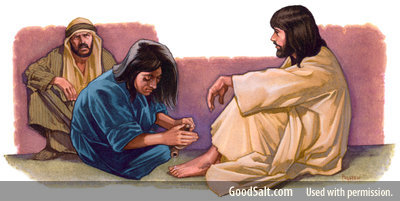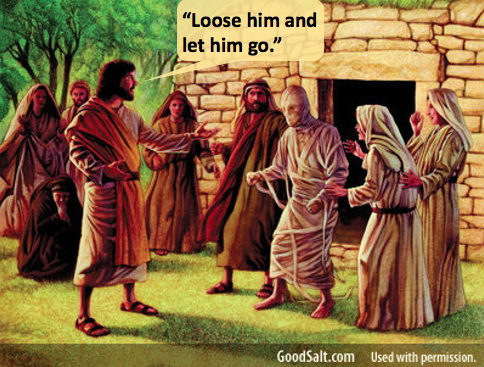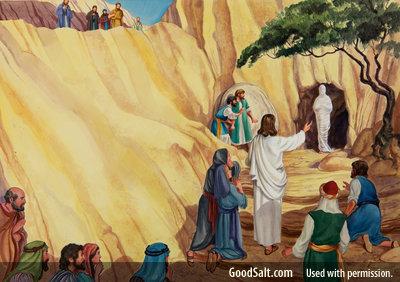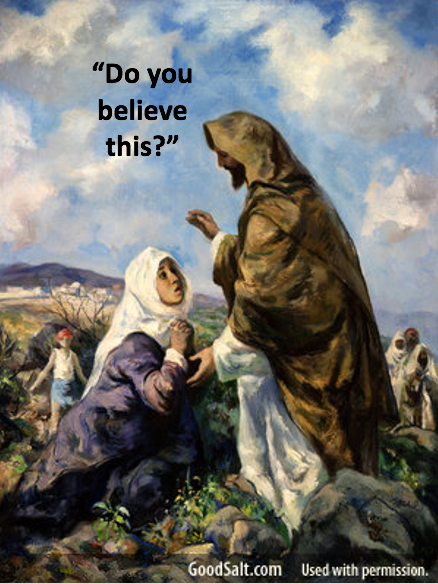“You are My friends if you do whatever I command you.” John 15:14
Last time we learned the first way to be Jesus’ friend was to live in His love (John 15:9-11). Today we discover that the second way to be Jesus’ friend is to LOVE as HE LOVED (John 15:12-17). To help His disciples understand this command to abide in His love, He repeated something He had said before. “This is My commandment, that you love one another as I have loved you.” (John 15:12). You may ask, “What is Jesus’ love like?”
a. IT IS UNCONDITIONAL (John 15:12; cf. 13:1-11; Luke 22:24). Earlier, the disciples had been fighting among themselves about who was the greatest among them (cf. Luke 22:24). Jesus then humbly washed their dirty feet (John 13:1-11). Christ loved them even though they did not deserve it. Christ’s love was not a response to our love. He loves us even if we never loved Him back. Jesus loves us when our walk of faith is weak or when it is strong. He sticks with us in the good times and the bad. Nothing about us makes Jesus love us. He loves us because it is His nature to love. If Jesus waited for us to love Him first, He would still be waiting. Thank God that Jesus loved you and me first. His love does not require that you love Him back.
If we are going to love one another as Jesus loved us, then we must love one other whether we deserve to be loved or not. God’s love is not an emotion. “You can love people whom you may not necessarily like because love is not dependent on your feelings. That’s why Jesus can command to ‘love your enemies’ ” (Matthew 5:44).” 1 Love is a choice to do what is best for another person. Christ living in us wants to unconditionally love others through us.
b. IT IS SACRIFICIAL (15:13). Next Jesus said, “Greater love has no one than this, than to lay down one’s life for his friends.” (John 15:13). The greatest love of all was to give up your life for your friends. In the context, this must refer to Jesus’ upcoming death on the cross (cf. John 10:11, 15, 17-18; 12:32-33; 13:1ff). This is the greatest expression of friendship.
“There was an orphanage near an American Marine Base in Viet Nam. One day the Viet Cong fired mortar shells into the orphanage, killing dozens of children and wounding many more. A boy named Kai had a seriously wounded friend who needed a blood transfusion. Kai’s friend had a rare blood type and only Kai’s blood matched it. Little Kai had never heard of a blood transfusion but when the American doctors explained it would save his friend’s life, little Kai volunteered.
“As the blood began to flow from Kai to his friend, Kai began to whimper. When the doctors asked if it hurt, he said no. A little later he whimpered again. Again, he told the doctors it did not hurt. The doctors asked, ‘What’s wrong, Kai?’ With tears coursing down his light brown, dusty cheeks, Kai asked, ‘When am I to die, sir, when am I to die?’ You see, little Kai didn’t know that you only give a little blood. He thought you gave it all, and he was willing to do so for his little friend.” 2
Are we willing to sacrifice for one another? Men, it may mean giving up a game of basketball or a TV show to listen to someone share their problems with you. Ladies, it may involve laying aside that intriguing novel to listen to your neighbor process a misunderstanding they had with someone. When a need arises among the people in your life, reach out to help them in love.
c. IT IS OBEDIENT (John 15:14). Jesus would give His life for His friends. Who are His friends? “You are My friends if you do whatever I command you.” (John 15:14). Jesus’ friends are those believers who keep His commandments. We may say that Jesus is our best Friend, but would He say we are His friends? The true test of friendship with Christ is obedience to “whatever” He commands you to do. Friendship with Christ is a discipleship issue, not a salvation issue.
Twice Abraham was called a friend of God in the Old Testament: by God (Isaiah 41:8) and by men (2 Chronicles 20:7). James 2:21-23 explains why Abraham was justified before men by works when he offered up his son, Isaac. Works justify us before men, but not before God (cf. Romans 4:2). Abraham was justified before God by faith alone (Genesis 15:6) over twenty years before he offered up Isaac (Genesis 22). The faith that justified him before God was matured by his act of obedience in offering up Isaac (James 2:22) and filled full of meaning (James 2:23a). Men could declare Abraham to be a “friend of God” because they saw that he had an intimate relationship with God through his obedience. So friendship with God is based upon obedience.
Do people know that we are friends of Christ because of our obedience to Him? Our obedience to Jesus is a compelling testimony to the world that we are vitally connected to Him, especially when we keep His commandment to love one another. Our friendship with Christ is realized by others through our actions. This means we love one another whether we feel like it or not. But instead of ignoring our feelings, we are to deal with them so we can be available to love others. We need to experience God’s love and power before we can love others with His love.
d. IT COMMUNICATES TRUTH (15:15). Then Jesus said, “No longer do I call you servants, for a servant does not know what his master is doing; but I have called you friends, for all things that I heard from My Father I have made known to you.” (John 15:15). During their time together, Jesus viewed these men as servants and Himself as their Master. The responsibility of a servant was to submit to the will of his master. A servant is nothing more than an instrument. He simply does what he is told because he has no other choice. He does not have a close relationship with his master, as friends do. The servant does not know the personable issues about his master’s life. He just follows orders.
But now Jesus calls His disciples “friends.” Why? He says, “For all things that I heard from My Father I have made known to you.” These men who had been Jesus’ servants were now His friends because He had kept nothing back from them. He had revealed all that the Father had made known to Him (cf. John 14:21). A master shares his will with his servants. But a friend shares his heart with his friends. “There are no secrets between friends.” 3 Christ shared His heart with His disciples, so they could bear fruit to the glory of His Father.
Many years ago, a Christian writer went through a deep period of doubt and temptation. He questioned his ministry, his qualifications, his marriage, his salvation. Anguished and burdened, he finally went to a friend and confessed his feelings. As they talked and prayed together over the course of several weeks, his perspective returned. Peace came into his heart, and he experienced the joy of the Lord again.
If we can receive this kind of help from talking with a friend, how much more beneficial would it be to be completely open with the Lord Jesus? He is the Best of friends. Alexander Maclaren wrote, “If we are friends of God, we shall have no secrets from Him. There are very few of those who are dearest to us to whom we could venture to lay bare all the depths of our hearts. There are black things down in the cellars that we do not like to show to any of our friends… But you should take God all through the house. And if there is the trust and the love that l have been speaking about, we shall not be afraid to spread out all our foulness, and our meanness, and our unworthy thoughts of, and acts towards, Him, before His ‘pure eyes and perfect judgment,’ and say, ‘Nobody but my best friend could look at such a dungheap, but I spread it before Thee… Tell God all, if you mean to be a friend of His.” 4
Christ did not withhold any truth from His disciples. There were no secrets between Him and His friends. Close friends communicate openly and honestly. Even though the truth may hurt at times, it is better to share it than to conceal it. Concealing the truth allows the situation to worsen. I appreciate it when my wife is open and honest with me about her true feelings. It shows me that she cares about our relationship. Friendship involves open communication. As we abide in Christ, He can enable us to share openly with one another.
e. IT TAKES THE INITIATIVE (15:16). Jesus continued and said, “You did not choose Me, but I chose you and appointed you that you should go and bear fruit.” (John 15:16a). Christ took the initiative in choosing His disciples to “go and bear fruit.” Normally disciples choose their own teacher, 5 but Jesus chose them. All around the world today, students seek out the teachers of their choice and attach themselves to them. But Christ’s disciples did not take the initiative. After spending all night in prayer to God (Luke 6:12-16), Jesus “chose” His disciples and “appointed” them to their mission to “go and bear fruit.” Notice that Jesus did not “choose”them to be saved or to have eternal life. 6 His selection of them was related to their mission and ministry, not their salvation. John’s gospel never refers to people “being chosen from all eternity for eternal life or death.” 7
The divine election of God in the Bible is related to service, not salvation. 8 In the Old Testament, God chose individuals to serve Him such as Abraham (Genesis 12:1-3), Moses (Exodus 3:12; Numbers 16:5-6, 28), Aaron (Numbers 17:5), King David (2 Samuel 6:21; 1 Kings 8:16), Jeremiah (Jeremiah 1:5), and the Messianic Servant (Isaiah 49:5-9; 52:13-53:12). He chose a group of people, Israel, to continue the mission He began with Abraham (Genesis 12:1-3; Exodus 19:5-6; Deuteronomy 7:6-8; 14:2; 1 Kings 3:8; Psalm 33:12; 106:5; Isaiah 43:10; 45:4; 65:9, 22; cf. Matthew 24:22, 31; Mark 13:20; Luke 18:7; Romans 9:11; 11:28; 2 Timothy 2:10; 1 Peter 2:4). 9
In the New Testament, Jesus chose Twelve men to serve as His apostles (Luke 6:12-16; John 15:16). The fact that Judas was chosen by Christ demonstrates that this election was to service, not salvation since Judas never believed in Jesus (cf. John 6:64; 13:10-11; 17:12). Christ said that Paul was “a chosen vessel of Mine” to preach to the Gentiles (Acts 9:15-16). Peter was also chosen for service: “God chose among us, that by my mouth the Gentiles should hear the word of the gospel and believe” (Acts 15:7-8). 10
Just as Jesus took the initiative in choosing His disciples for their mission and service, so we must do the same in our relationships with one another. The importance of choosing believers to train in discipleship is underscored by the fact that Christ prayed all night to God on a mountaintop before He selected His disciples (cf. Luke 6:12-16). We need God’s wisdom and leading to choose men and women who will be “faithful” followers of Christ (cf. 2 Timothy 2:2).
Are we sharing the gospel with non-Christians and then asking them to meet with us for discipleship? We must be intentional about sharing the gospel with the lost and then teaching those who believe in Christ to obey all of His commandments (Matthew 28:20) because disciples are not born, they are made. 11 Christian growth is not automatic. It requires a commitment to follow Jesus regardless of the costs (cf. Luke 14:25-33).
Finally, f. IT BEARS FRUIT THAT LASTS (15:16b-17). “And that your fruit should remain, that whatever you ask the Father in My name He may give you.” (John 15:16b). Christ also “chose”and “appointed” His disciples that they “should… bear fruit… that… should remain.” This fruit is related to the fruit of evangelism because it remains and cannot be lost (cf. John 4:36; 10:28-29). One of the most unloving things we can do is keep God’s love and His gospel to ourselves. This lasting fruit is also connected to answered prayer – “that whatever you ask the Father in My name He may give you.” To ask the Father in Jesus’ “name” means to pray for what Jesus would pray. God desires that all people be saved from hell (I Timothy 2:3-4). When we pray to that end, God answers that prayer. Prayer is the backbone to reaching the lost with the gospel of Christ. As God’s people pray, the Holy Spirit prepares the lost to hear and believe the gospel (John 16:7-11).
When we pray and preach the gospel, God saves people as they respond in faith, resulting in lasting “fruit.” How exciting to see people come to faith in Christ! As we allow Jesus to live through us, our desire to see people obtain eternal life will increase. This week you may be asked by another believer to go with them to share the gospel with a family member or friend. Or maybe someone will ask you to pray for an individual that they just shared the gospel with. Next Christ says, “These things I command you, that you love one another.” (John 15:17). The way to honor Christ’s Lordship in our lives is to obey Him especially as it relates to loving one another. And as we obey Him, people can see that we are His friends.
After one of the worst battles of the American Civil War, a small remnant of a Confederate regiment stood alone on a grassy knoll. A Southern officer on horseback approached the small band of soldiers. “Where is your captain?” the officer inquired. “There he lies,” they said, pointing to his lifeless form a few feet away. “And what are you men doing here?” the officer asked. “Sir, we are paying our respects, giving him our final salute. He told us to hold this hill, and we have done just what he said.” What loyalty! The proof of their allegiance was complete obedience to his orders.
As Christians, we should also remember our great Captain, Jesus Christ. Although He died, He does not remain on the field of battle. He rose again and lives victoriously at the right hand of God the Father! He freely gave His life that He might save us and bring us to God. This is all the more reason to give Him our total commitment to obey Him.
Prayer: Lord Jesus, no one deserves our allegiance more than You! Thank You for laying down Your life for me. No greater love has ever been shown to me than this. Right now I give You everyone and everything to use for Your purposes. Please help me to abide in You and You in me so Your love will flow through me to others. This world could use a lot more of Your love. May they know I am Your friend by my love for You and others, especially the lost who need to hear Your life-giving gospel message. In Your mighty name I pray. Amen.
ENDNOTE:
1. Tony Evans, CSB Bibles by Holman. The Tony Evans Bible Commentary (B&H Publishing Group, Kindle Edition, 2019), pg. 1807.
2. See https://bible.org/illustration/john-1513 on April 17, 2018.
3. J. Dwight Pentecost, The Words & Works of Jesus Christ, (Grand Rapids: Zondervan, 1981), pg. 443.
4. Taken from Alexander Maclaren’s sermon on James 2:14-26 entitled, “Faith Without Works” at http://www.preceptaustin.org/maclaren_on_james_2.
5. Edwin A. Blum, The Bible Knowledge Commentary, New Testament Edition (Wheaton: Victor Books, 1983), pg. 326.
6. Shawn Lazar, Chosen to Serve: Why Divine Election Is to Service, Not to Eternal Life (Denton, TX: Grace Evangelical Society, 2017), pg. 140.
7. Ibid., pg. 147.
8. Shawn Lazar’s article, “Election for Baptists: Why Biblical election is to service and privilege, not to eternal life,” at https://faithalone.org/grace-in-focus-articles/election-for-baptists-why-biblical-election-is-to-service-and-privilege-not-to-eternal-life/; cf. Robert Wilkin, “THE DOCTRINE OF DIVINE ELECTION RECONSIDERED: ELECTION TO SERVICE, NOT TO EVERLASTING LIFE,” at https://faithalone.org/journal/2012ii/Wilkin.pdf; cf. Anthony B. Badger, Confronting Calvinism: A Free Grace Refutation and Biblical Resolution of Radical Reformed Soteriology (Anthony Badger, 2013), pp. 151-212.
9. Lazar, Chosen to Serve…, pp. 41-55, 175-199.
10. Lazar, “Election for Baptists…”
11. see Dr. Charlie Bing, GraceLife Notes, no. 23, “Are Disciples Born, or Made?” at http://www.gracelife.org/ resources/gracenotes/?id=23.











